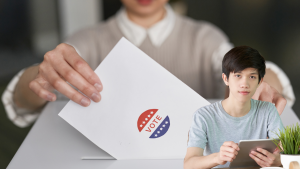
Listen to this note:
The Asian-American, Native Hawaiian and Pacific Islander communities are the fastest growing electorate in the United States. More than 15 million of them will be able to vote on November 5, many of them will do so for the first time, so this sector of the population can make a difference, however little is said about their needs.
"This segment of the population has grown quite a bit, representing the margin of victory," said Shekar Narasimhan, founder and president of the AAPI Victory Fund, speaking from the battleground state of Michigan. during a briefing held by Ethnic Media Services.
Narasimhan said that around 1.75 million people from the APPI community are eligible to vote and the total margin of victory of the voters in 2020 in the presidential elections in seven states was 385 thousand votes.
In 2020, there was a virtual campaign and AAPI communities are among the most active on social media, but the community was not directly reached because the media is not channeled and there are low information borders.
To present the real needs, they approach to expose themselves directly from person to person, talking about migration, visa issues, public policies, etc.
